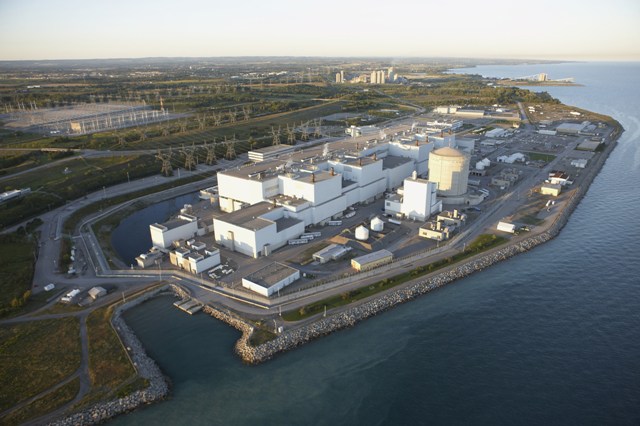
OPG to boost executive salaries $6.8M; Metrolinx proposes $100K hike for CEO
by Allison Jones, The Canadian Press

Two Ontario crown corporations plan executive pay hikes as province lifts a public-sector wage freeze; critics call move a "slap in the face"

The province says OPG needs to be able to attract and retain talent in order to ensure the safety of Ontario’s nuclear power generation system. PHOTO: Ontario Power Generation
TORONTO—Ontario Power Generation says salaries for its executives are expected to rise by up to $8 million in the next few years as the provincial government lifts a public-sector wage freeze.
Meanwhile, transit agency Metrolinx is proposing to boost its CEO’s pay by up to $118,000, which would see him earn a maximum of $479,500.
All broader public sector agencies are being tasked with posting their proposals for new executive compensation packages under guidelines that came into force in September.
The government sent colleges back to the drawing board after concerns were raised about the salary comparators that they were using for proposals that would boost presidents’ salaries by up to 50 per cent.
OPG landed on a maximum salary of $3.8 million for its CEO—who currently earns $1.5 million—though it says it is setting the target significantly lower.
Spokesman Neal Kelly says the CEO’s salary will actually remain unchanged for three years, but the other approximately 80 executives will now be eligible for merit pay, and when the new program is fully implemented in 2019, that’s expected to cost an extra $6 million to $8 million annually. Kelly said OPG has saved $10 million in staff reductions since 2012.
OPG, which operates two nuclear sites, was granted permission by the government to use private-sector comparators, as the size and scope of its operations are “more complex than those of many other public sector organizations in Canada” and it has primarily recruited its executives from the private sector.
A spokesman for Energy Minister Glenn Thibeault said the safe operation of Ontario’s large nuclear generating stations requires “technical experts of the highest standard.”
“We fundamentally believe Ontario Power Generation must be able attract and retain this highly specialized expert talent to ensure the safety of Ontario’s nuclear power generation system and deliver key nuclear projects such as the Darlington Refurbishment,” Dan Moulton said in a statement.
OPG is responsible for more than $40 billion in assets, and has $5 billion in annual revenue and more than 9,000 employees.
NDP finance critic John Vanthof called it a “slap in the face” to Ontario families that a CEO of OPG could be eligible for a salary of up to $3.8 million.
“Most Ontarians haven’t seen a real increase in pay in years, despite soaring utility and housing costs,” he said in a statement. “It just isn’t fair for the executives of our public utilities and institutions to be raking in huge salaries, raises and bonuses while so many Ontarians are struggling to put food on the table.”
Metrolinx spokeswoman Anne Marie Aikins says the agency’s human resources committee will make a recommendation to the board of directors on where—within the $375,300 to $479,500 range—the president’s salary should fall once the public consultation is over.
Progressive Conservative transportation critic Michael Harris said these raises could see executives who were recently called on the carpet get 30 per cent raises.
“When everyday Ontarians see single-digit increases at best, (Premier) Kathleen Wynne is rewarding these executives to the tune of hundreds of thousands of dollars, potentially,” he said.
Metrolinx came under fire in the latest auditor general report for not holding contractors and design consultants accountable for projects that were late or inadequate and still awarding new work to contractors that had performed poorly in the past.
The auditor said one contractor working on a pedestrian bridge over Highway 401 in Pickering installed one of the bridge trusses upside down, but was still paid millions of dollars. Metrolinx disputes this, saying it was a misaligned support beam and not an upside-down truss.
Metrolinx is also dealing with a troublesome joint roll-out of the Presto card system with the Toronto Transit Commission, with delays and technical glitches.
A spokeswoman for Transportation Minister Steven Del Duca said Metrolinx’s proposal is only the first step of the process and no decisions have been made.
Public sector agencies are required to post their executive compensation proposals publicly for 30 days of comment. Metrolinx’s proposal is available in a link on the homepage of its website.
OPG’s public comment period is over, but it received four public comments.
Ontario’s new executive compensation framework caps salaries at the 50th percentile of “appropriate comparators.”